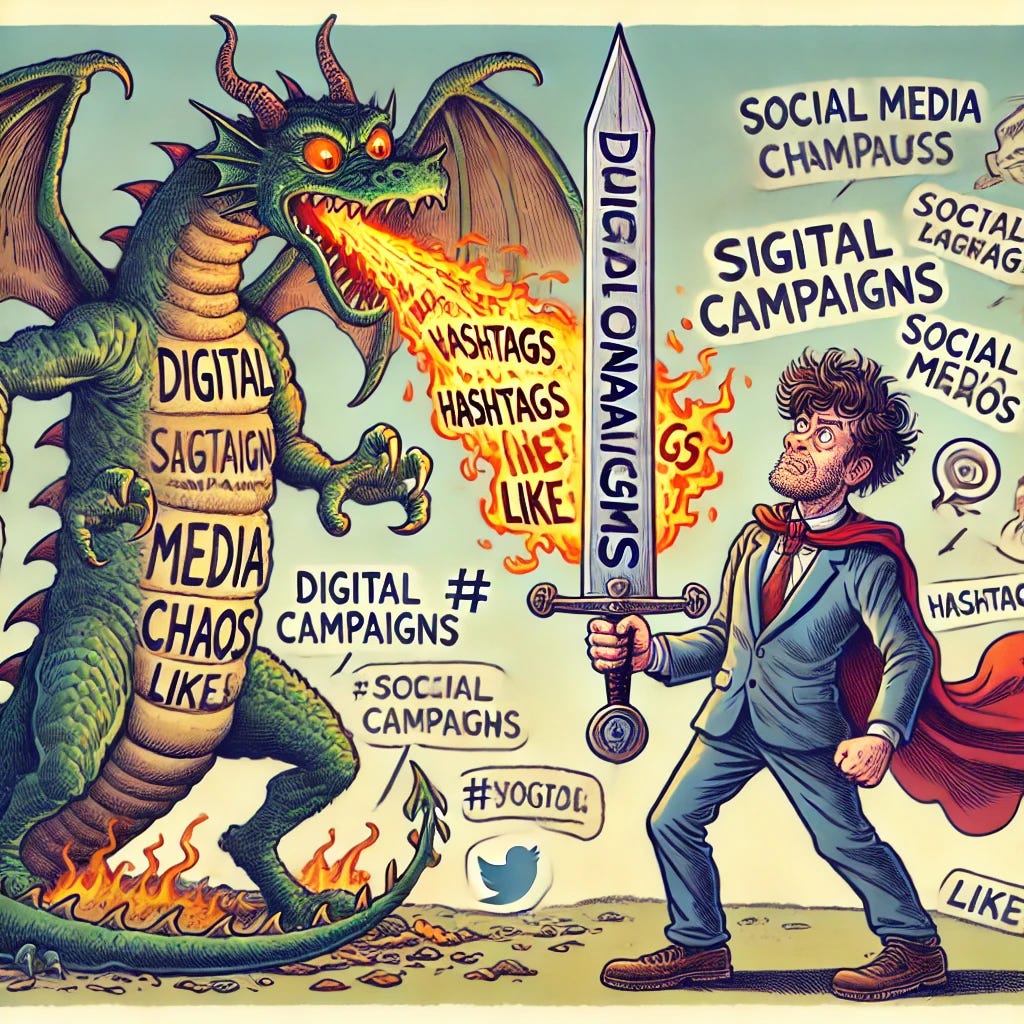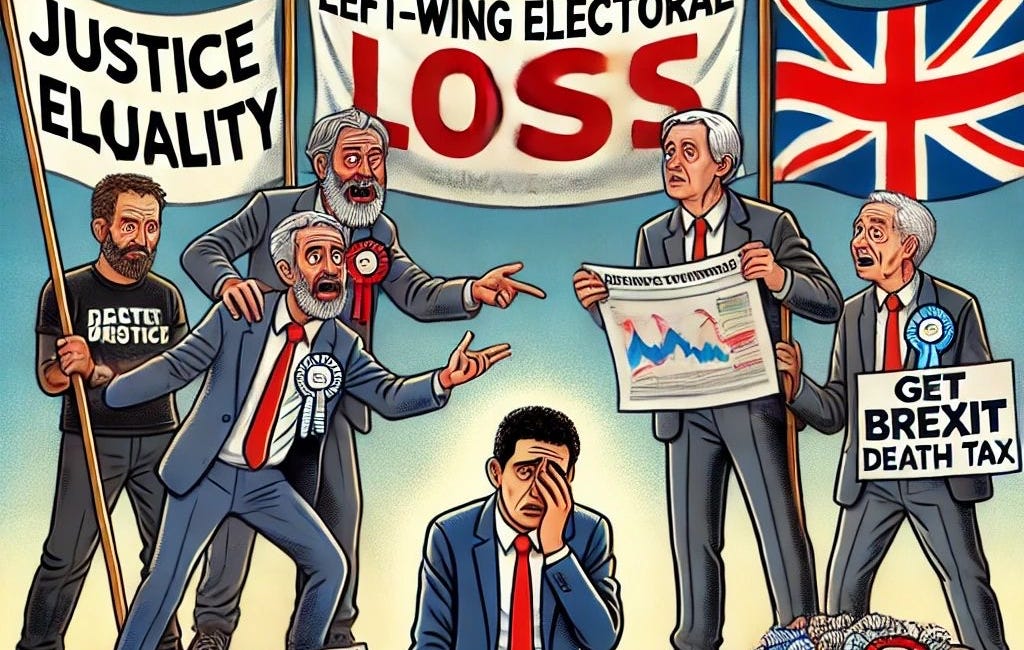The Meme Lords: How Two Kiwis Shitpost Their Way to Power
When quality took a backseat to content blitzkrieg—and it worked.
Topham Guerin: proving that in the battle of clicks, quality doesn’t matter when you’ve got memes.
In the murky world of digital politics, where attention spans are short and facts are optional, Topham Guerin—a New Zealand-born political social media and strategy agency—has managed to carve out a unique niche: weaponising quantity over quality, one shitpost at a time.
Founded in 2016 by Sean Topham and Ben Guerin, two Kiwis who reportedly grew up on pirated Adobe software and political fervour, the agency thrives on what they call “lots of little fires.” Their ethos is simple: in an era of algorithmic chaos, fire enough content at the wall, and something will stick—preferably in Comic Sans.
Their breakthrough moment? The 2019 UK General Election, where Boris Johnson’s Conservatives needed to “Get Brexit Done.” Topham Guerin, filled digital feeds with memes, ironic low-quality graphics, and trollish ads. The pièce de résistance? A tweet with a simple “MPs must come together to get Brexit done” scrawled in Comic Sans—a move so ironically terrible it went viral. People shared it because it was bad.
But their real low blow was their renaming of the Conservatives’ official Twitter account to “FactCheckUK” during a televised debate. For a dubious, but glorious moment, the UK’s ruling party pretended to be an impartial fact-checker—because, hey, who doesn’t love a little post-truth cosplay? Critics fumed, but Topham Guerin had proven that trolling is a campaign strategy.
Forget glossy videos or polished graphics
The methods? “Shitty memes,” as Ben Guerin puts it. Forget glossy videos or polished graphics; their style prioritises volume and virality over presentation. Topham Guerin relies on quantity—meme after meme, post after post—to overwhelm the audience and dominate timelines. Think digital carpet bombing but with Minions gifs and political slogans.
Topham Guerin’s magic touch didn’t stop at the UK. Their fingerprints were all over Scott Morrison’s 2019 “miracle” election win in Australia, a campaign notorious for its sharp use of Facebook memes and relentless content barrage. The strategy? Flood social media with quantity over quality—anything from DIY-style graphics to outright absurd slogans—designed to grab attention and sow doubt among undecided voters. Morrison’s “ScoMo” persona flourished under this blitz, balancing self-deprecating humour with subtle fear campaigns against Labor’s policies. Critics later argued that while Morrison’s win seemed grassroots, the orchestrated digital chaos was anything but accidental.
More recently, whispers abound that Topham Guerin is in talks for a contract supporting Peter Dutton and the Coalition’s bid for the 2025 Australian election (confirmed since my original writing). While details remain under wraps, Dutton’s team has reportedly been eyeing a “new era” of digitally driven political warfare, one that mirrors Topham Guerin’s method of overloading platforms with volume-heavy, hyper-partisan messaging—ironically, the same techniques that stirred concern about AI-driven misinformation in campaigns like the ACT Liberals’ earlier AI-generated ads. If true, expect memes, smirks, and perhaps a freshly lacquered “Dutto” rebrand on every screen you scroll past.
Yet it’s not all viral pranks and political controversy. Their COVID-19 campaigns in the UK and New Zealand saw mixed success. One Kiwi ad comparing the virus to a “dragon” confused the public more than it informed them. Another infamous UK government ad, featuring women cleaning while a lone man reclined on a sofa, sparked outrage for its blatant sexism. Clearly, nuance isn’t their strong suit—just speed.
Sound familiar? Their tactics are reminiscent of agencies like Cambridge Analytica (before they imploded) or Crosby Textor, famed for their ruthless precision in messaging. However, where the latter uses data science and slick delivery, Topham Guerin adds a layer of self-aware irony. It’s guerrilla warfare meets meme culture—digital campaigns that feel so amateur it’s actually sinisterly genius.
Surprisingly, they’ve lent their meme-churning prowess to causes as varied as ovarian cancer awareness campaigns and pro-business groups like New Zealand’s Taxpayers’ Union. As Sean Topham diplomatically puts it, their agency is “agnostic”—meaning they’ll work for anyone with a cheque, political ideals be damned.
So next time you see a badly edited meme that somehow dominates your feed, don’t dismiss it as digital detritus. Behind that Comic Sans post might be Topham Guerin, weaponising irony to change the course of elections, one shitpost at a time. It’s not art—it’s science. Well, sort of.
References:
1. The Guardian: How Boris Johnson’s Conservatives Weaponised Memes
2. The Spinoff: The Memeing of Life: An Interview with Topham Guerin
3. The New York Times: How Digital Consultants Helped Get Brexit Done
4. Someone in London: Work That Really Works - Topham Guerin
5. BBC News: UK Government Apologises Over Sexist COVID-19 Advert









Inspiring
If race hatred ethnic hatred religious hatred city criminals had not destroyed my gardens and everything and burglarized my house I would be playing and working on my gardens......and home...and would have gotten 2 more border collies to be playing outside....(now it's just the Dire Wolf and no border collies)...
I always heard about "memes" but never saw any unless they showed them on the free TV.
So what you're telling me is this whole online "social network" stuff is even worse than this old Luddite knew.....
I really didn't want to be online but felt compelled 1st to open an art sales print on demand website.....I'm unable to continue working outside the home...then recently adding substack for writing and posible income....?
I hate myself for being online instead of outside but since I'm here with a point of view.......maybe I should become a Mememaker.....sounds like some memes are created by political consultants being paid to manipulate public opinions...
Others just for fun? Or profit.?
Do other Mememakers make money?
Do people pay to subscribe just to Mememakers?
I was around before personal computers ....before Pong....before Video Games....and Joining Substack a month or two ago is the first time in my life that I have been exposed to "Memes" ....I wonder how much they effect people at large?
I might try making one....this online world is so weird! If you want to see or buy my art click on the Monarch Butterfly Caterpillar Eating Milkweed Photo that I use for my artist profile photo on my print on demand Website.
Dodobbird.pixels.com